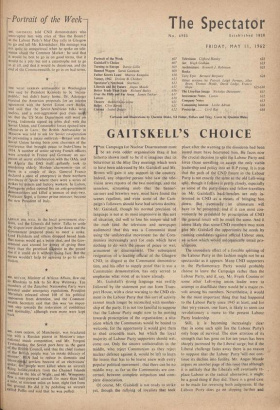—Portrait of the Week— MR, GAITSKELL told CND demonstrators who
interrupted him with cries of 'Ban the Bomb!' at the Labour Party's May Day rally in Glasgow to go and tell Mr. Khrushchcv. His message was not quite so unequivocal when he spoke on tele- vision about the Common Market: he said that it would be best to go in on good terms, that it would be a pity but not a catastrophe not to go in at all, and that it would be disastrous, and the end of the Commcnwealth, to go in on bad terms.
THE WEST GERMAN ambassador in Washington was said by President Kennedy to be 'incom- patible; but didn't hurry home. Dr. Adenauer rejected the American proposals for an interim agreement with the Soviet Union over Berlin. and said that the Soviet-American talks wer. useless, and a non-aggression pact even mofif so. But the US State Department stilt went on trying. Indonesia signed an mins deal with the Soviet Union, and Communist forces opened new offensives in Laos: the British Ambassador in Moscow was told to ask for Soviet co-operation in preventing a major outbreak—Britain and the Soviet Union having been joint chairmen of the conference that brought peace to Indo-China in 1954. A number of senior serving French officers were arrested in France and Germany on sus- picion of secret collaboration with the OAS, and in Algeria the OAS itself gallantly took to murdering elderly Moslem charwomen—ten of them in a couple of days. General Franco declared a state of emergency in three northern provinces of Spain where there were a series of strikes by miners and factory workers. In Lisbon, Portuguele police opened fire on anti-government demonstrators and killed a woman of sixty-two. Professor Segni, a former prime minister, became the new President of Italy.
*
LABOUR DID WELL in the local government elec- tions, and the Liberals did better. Talks to settle the dispute over dockers' pay broke down and the Government prepared plans to meet a strike. Lord Hailsham and others dropped broad hints that nurses would get a better deal, and the Gov- ernment cast around for aAway of giving them more than the promised scipence in the pound rise if it could do it without losing face. But the nurses wouldn't help by agreeing to go to arbi- tration.
*,
Ma. BUTLER, Minister of African Affairs, flew out to Rhodesia to talk to Sir Roy Welensky. Ten members of the Zanzibar Nationalist Party were arrested under emergency regulations. President Nkrumah released about 160 of his political opponents from detention, and the Common- wealth Secretary said that this was 'an impor- tant step towards the restoration of confidence
and normality,' although even more were kept back,
*
Mk JOHN OGDON, of Manchester, was bracketed top with a Russian pianist in Moscow's inter- national music competition, and Mr. Yevgeni Ycvtushenko, the Soviet poet-here as the guest of the British Council, said that the chief feature Of the British people was 'an innate delicacy of Manner.' BEA had to reduce its domestic and Mternatitonil services because of an electricians' strike; ten pcople were killed when an aircraft eying holidaymakers' from the Channel Islands crashed in the Isle of Wight; and Mr. Wimpenny flew a man-powered aircraft for more than half a mile, at nineteen miles an hour, eight feet from the ground. He did it by pedalling an aircraft called Puffin and said that he was puffed.


































 Previous page
Previous page